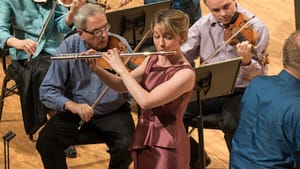Stay in the Loop
BSR publishes on a weekly schedule, with an email newsletter every Wednesday and Thursday morning. There’s no paywall, and subscribing is always free.
Freeman vs. Freeman
Orchestra 2001: Love and Madness and Chamber Orchestra FIRST EDITIONS

James Freeman didn’t compete with himself this weekend, but his brainchildren staged a lively confrontation. Freeman founded Orchestra 2001 in 1988 and turned it into an internationally recognized exponent of music created in the 20th and 21st centuries. Now, two years after his retirement, he’s started a new organization, Chamber Orchestra FIRST EDITIONS, presenting programs that combine new pieces with works from the earlier years of Mozart’s huge outpouring.
Both organizations presented concerts this weekend, with Freeman conducting his new offspring and his successor, Jayce Ogren, conducting Orchestra 2001. The two concerts even sported similar structures. Both programs ended with star turns and began with first halves devoted to new works. The main event at the Orchestra 2001 concert presented baritone Randall Scarlata in Peter Maxwell Davies’s 1969 tour de force Eight Songs for a Mad King. At the FIRST EDITIONS concert, flute star Mimi Stillman provided a grand climax, playing Mozart’s first flute concerto.
Demanding madness
Eight Songs for a Mad King is a powerful, harrowing portrait of mental illness, based on the bouts of insanity that afflicted George III. Scarlata played it clad in a hospital gown and 18th-century-style wig, surrounded by musicians in black masks. Ogren entered clad in a tight, buttoned-up suit with attaché case and conducted from a table, as though examining the harried figure sitting before him.
It’s a demanding role for the vocalist, requiring howls, screeches, and tricky musical effects. At times, Scarlata had to sing one word in a majestic bass and the next in a castrato falsetto.
Scarlata endowed the role with the dignity of a tormented bull at bay. We now know George III was probably afflicted with a genetic chemical imbalance. For him, it must have felt like an attack by internal demons.
Heavenly music
I have a friend who advises me that when Mimi Stillman picks up a flute, “God smiles and says, ‘I did something right.’” I don’t feel qualified to pass judgment on theological pronouncements, but I’m happy to pass on the information for those who may find it of value. I can tell you that Stillman’s performance at the FIRST EDITIONS concert drew a well-deserved round of applause at the end of the first movement. Stillman has described the slow movement as an “aria for flute”; she gave it an operatic mix of technique and expression, lyricism, and jauntiness.
The newer pieces at both concerts were a mixed bag. The Orchestra 2001 offerings both drew on popular roots. David Lang’s cheating, lying, stealing claimed a blues and country parentage; Bryce Dessner’s Murder Ballades takes its musical material from U.S. murder songs. They both had their virtues, like Dessner’s folksy melodies, but I found them too repetitious. Lang’s opening section repeated itself for some time before it began to move.

The first two pieces at the FIRST EDITIONS concert could have also used more musical variety, but succeeded as expressions of deep emotions. They both had an edge I didn’t hear in the 2001 pieces, perhaps because of the subject matter. Robert Maggio's Bright Elegy is a memorial to his mother and Ingrid Arauco’s Via Cordis captures the mysticism of the desert.
Curt Cacioppo’s A Meeting of Souls is essentially a fantasy based on the famous air in the second movement of Bach’s third orchestral suite. Cacioppo wrote it because a conductor wanted to play the suite with a modern substitute for Bach’s original. Cacioppo started with a good foundation and used it to produce something uniquely his own—a true meeting between a modern spirit and one of the greatest souls in music history.
Crossover and competition
The concert ended with an eight-minute work Mimi Stillman premiered at a 2015 Dolce Suono concert. Zhou Tian’s Viaje is based on the saga of the Spanish hero El Cid and the trials of his daughters. This is the third time I’ve heard some version of it, and I can understand why Stillman keeps it in her repertory. The flute passages and orchestration evoke all the gallantry and tenderness of the subject.
The main events at these concerts could have been scheduled by Orchestra 2001 during Freeman’s tenure. Freeman occasionally performed Bach and Mozart, performed in a modern style with a small orchestra and a touch of 18th-century informality. The newer pieces defined the difference between Freeman’s approach and Ogren’s: Freeman favors new music influenced by the classical tradition, while Ogren tilts toward composers influenced by popular music.
Can the Philadelphia region support two James Freeman creations? If it can, the dialogue between the two visions could add some extra spark to a new-music scene that already includes the Network for New Music and all the premieres our other music organizations present every season.
What, When, Where
Ochestra 2001: Love and Madness. Jayce Ogden conducted. Lang, cheating, lying, stealing; Dessner, Murder Ballades; Davies, Eight Songs for a Mad King. February 18, 2017, at Venice Island Performing Arts Center, 7 Lock Street, Philadelphia. (267) 687-6243 or orchestra2001.org.
Chamber Orchestra FIRST EDITIONS. Maggio, Bright Elegy; Arauco, Via Cordis; Cacioppo, A Meeting of Souls; Mozart, Concerto in G for Flute and Orchestra; Zhou Tan, Viaje. Mimi Stillman, flute; Curt Cacioppo, harpsichord; James Freeman, conductor; Heidi Jacob, associate conductor (A Meeting of Souls). February 19, 2017, at the Trinity Center, 22nd and Spruce Streets, Philadelphia. Chamberorchestrafe.org.
Sign up for our newsletter
All of the week's new articles, all in one place. Sign up for the free weekly BSR newsletters, and don't miss a conversation.
 Tom Purdom
Tom Purdom